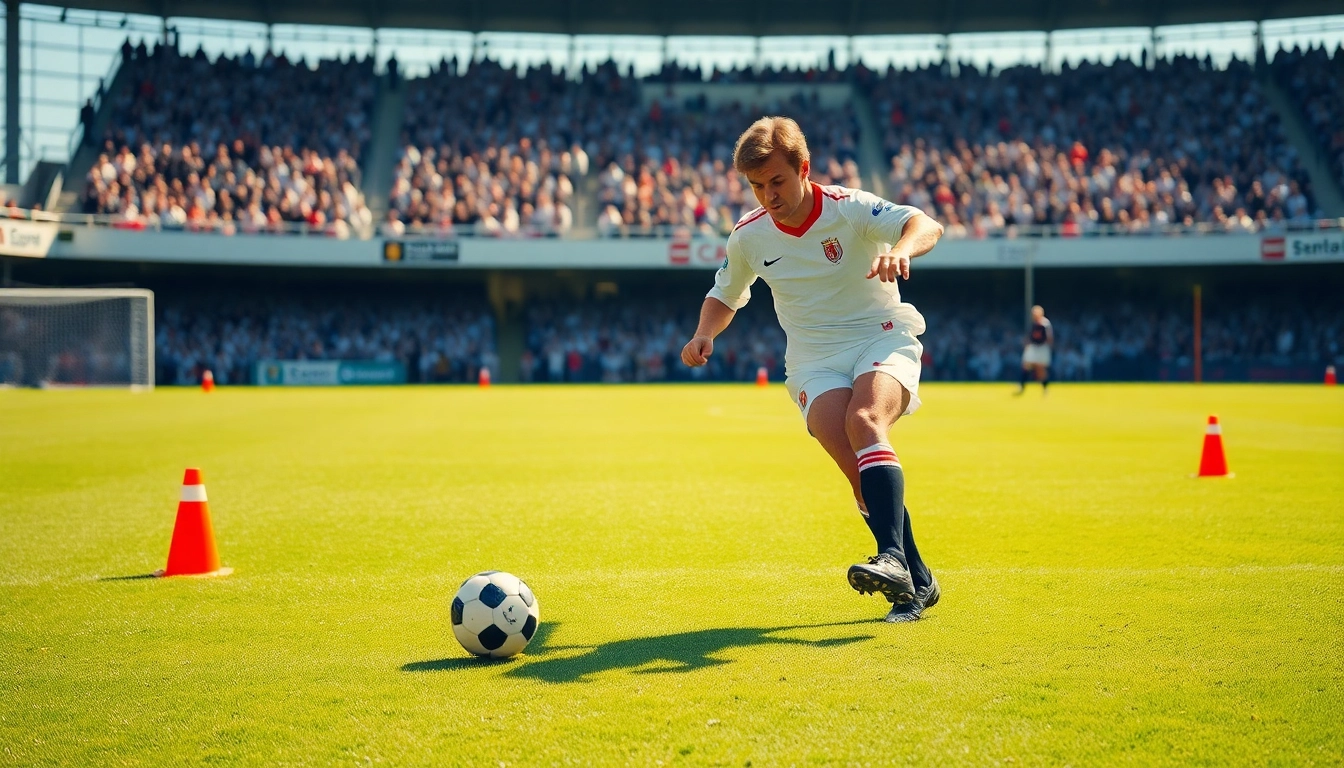Glenn Hoddle is a name synonymous with football excellence. His extraordinary career has left an indelible mark on the history of the sport. From his early life, showcasing immense talent as a young boy, to becoming a pivotal figure in English football – Hoddle’s journey is one of inspiration and skill. His influence stretches beyond the pitch, as he transitioned into a successful coach, commentator, and philanthropist. Throughout this article, we will explore the multifaceted life of Glenn Hoddle, delving into his early experiences, career highlights, and lasting legacy in the world of football. For a deeper insight into his life and contributions, you can learn more about glenn hoddle.
The Early Life of Glenn Hoddle
Background and Childhood
Glenn Hoddle was born on October 27, 1957, in the small town of Hayes, located in Greater London. Growing up in a working-class family, Hoddle’s childhood was characterized by a passion for sports from a very young age. His father, a keen amateur footballer himself, greatly influenced Glenn’s early interest in the game, fostering an environment that valued athleticism and competition.
As a child, Hoddle exhibited exceptional talent in football, showcasing a natural flair for dribbling and ball control. He attended local schools where he consistently performed well in sports, often standing out in football matches. His family, recognizing his talent, supported him in pursuing football, encouraging him in local teams and clubs. It was this unwavering support that would set the foundation for his future successes.
Initial Steps in Football
Hoddle’s first major step into the football world came during his teenage years when he joined the youth team of local club, Crystal Palace. However, his journey would take a pivotal turn when he was offered a place at the renowned Tottenham Hotspur Football Club after his exceptional skills caught the eye of scouts. At Tottenham, he honed his abilities further, developing into an influential playmaker known for his exceptional passing and vision on the pitch.
Breaking into Professional Football
In 1975, at the age of 18, Glenn Hoddle made his professional debut for Tottenham Hotspur. His first game was a landmark moment, marking the beginning of a promising career in football. Hoddle quickly established himself as a key player for the team, displaying his unique set of skills that included intricate dribbling and precise passing. As he gained more experience, he became an integral part of the squad, loved by fans and respected by his teammates.
Glenn Hoddle’s Career Highlights
Clubs and Achievements
Throughout his illustrious career, Hoddle played for several clubs, most notably Tottenham Hotspur and Chelsea. At Tottenham, he contributed to the club’s success during the late 1970s and 1980s, helping them win the FA Cup in 1981 and the UEFA Cup in 1984. His performances in these matches not only highlighted his exceptional individual talent but also solidified Tottenham’s reputation as a formidable force in English football.
After his time at Spurs, Hoddle moved to France to play for AS Monaco, where he further refined his skills in a different footballing environment. He later returned to England to play for Chelsea, where he continued to be an influential figure. Despite facing numerous challenges, including injuries, Hoddle’s determination never wavered, and he remained a pivotal player until his eventual retirement in 1993.
International Honors
Glenn Hoddle also represented the England national team, earning 53 caps and scoring 8 goals between 1979 and 1988. His international career was marked by memorable appearances, including participation in the 1982 FIFA World Cup and UEFA Euro 1980. Hoddle’s unique playing style and technical skills made him a valuable asset to the England squad. Although the team faced disappointments on the international stage, Hoddle’s impact was undeniable, as he consistently showcased his ability to influence games at the highest level.
Memorable Performances and Moments
Throughout his playing career, Hoddle produced numerous memorable performances that are etched in the minds of football fans. One of his most iconic moments came during a match against Manchester United in 1982, where he scored a stunning long-range goal that showcased his remarkable skill and vision. This goal, often regarded as one of the best of his career, exemplified Hoddle’s ability to change the course of a match single-handedly.
Additionally, his contributions to Tottenham Hotspur’s victories in domestic and European competitions solidified his status as a club legend. His connection with fans was palpable, and his creative style of play resonated with supporters for generations. Such performances not only defined Hoddle’s playing style but also enriched the culture of football itself.
Style of Play and Tactical Influence
Dribbling and Playmaking Skills
Glenn Hoddle was renowned for his exceptional dribbling and playmaking skills. His ability to maintain close ball control while navigating through tight defenses set him apart from his contemporaries. He possessed an innate understanding of space and positioning, which allowed him to anticipate the movements of both teammates and opponents. This tactical awareness translated into his ability to create goal-scoring opportunities from almost any position on the pitch.
Hoddle’s passing range was also a hallmark of his play. He could execute both short, incisive passes to break the lines and long diagonal balls to switch the play effectively. Such versatility in his passing made him a critical figure in transitioning the ball from defense to attack. Many coaches and players who followed in his footsteps cite Hoddle’s technique and creativity as a foundation for modern football tactics.
Comparisons with Contemporaries
When discussing footballing legends, Glenn Hoddle is often compared to contemporaries like Diego Maradona and Johan Cruyff. While the three played in different eras and styles, Hoddle’s technical ability allowed him to hold his own among these greats. His vision was particularly praised by elaborate analysts who recognized his unique capacity to read the game, likening him to some of the best playmakers in history.
Several players have hailed Hoddle as one of the finest English midfielders of all time. Comparisons to modern-day players like Kevin De Bruyne or Bruno Fernandes highlight how Hoddle’s vision and creativity still resonate well into the future. In many ways, he paved the way for a generation of playmakers, influencing the tactical evolution of football in England.
Impact on Modern Football
Hoddle’s impact on modern football extends beyond his playing career. His innovative approach to the game has inspired a generation of coaches and players alike. Post-retirement, he has shared his insights through various coaching roles, emphasizing the importance of technical skill, creativity, and tactical intelligence. His philosophy regarding the development of young talent in football underscores the necessity for nurturing creativity and self-expression in players.
Moreover, Hoddle’s tactical acumen has been recognized in coaching circles, where he has offered valuable insights on formations and strategies that cater to the strengths of individual players. His legacy is evident in the way modern football emphasizes a quick passing game, intelligent movement off the ball, and the importance of skillful playmakers. The essence of Hoddle’s style continues to be reflected in contemporary football, showcasing his lasting legacy in the sport.
Post-Retirement Contributions
Coaching Experiences
Following his retirement from professional play, Glenn Hoddle successfully transitioned into coaching. He took over managerial roles at several clubs including Swindon Town and Southampton, where he developed a reputation for instilling attacking football. His coaching tenure was marked by a focus on developing player strengths and encouraging a free-flowing style of play. Hoddle’s ability to connect with players allowed him to cultivate productive relationships, crucial for fostering team cohesion.
Hoddle’s coaching philosophy, which emphasized technical skills and tactical awareness, has been attributed to his own experiences as a player. He often utilized his insights into the game to teach younger players about decision-making under pressure, enhancing their overall performance. His adherence to nurturing budding footballers signifies his commitment to continuing the cycle of excellence in the sport.
Media and Commentary Roles
In addition to coaching, Hoddle has found success in media and commentary roles, offering his expert analysis on televised matches and football discussions. His deep understanding of the game and articulate communication style have made him a respected voice in the sport. Hoddle provides insights that range from tactical breakdowns to player evaluations, enriching the viewing experience for fans.
Through his media presence, Hoddle has been able to engage with a broader audience, sharing stories from his playing career and reflections on the evolution of football. This role has allowed him to contribute to the cultural context of football, ensuring that his legacy continues to reach fans old and new.
Charitable Activities and Foundations
Beyond football, Glenn Hoddle has been actively involved in charitable endeavors, focusing on causes that resonate with him personally. His commitment to various charitable foundations illustrates his dedication to giving back to the community. Hoddle has participated in numerous fundraising events, often leveraging his status as a football icon to support causes ranging from health to education.
Hoddle’s philanthropic work includes promoting awareness around health issues, notably his efforts concerning cardiac health which stem from his own experiences after suffering from a serious medical condition. His advocacy serves to benefit others and raise awareness, reinforcing the impact athletes can have on matters of social importance.
Legacy and Recognition
Honors and Awards
Glenn Hoddle’s storied career has earned him numerous accolades and honors, both as a player and coach. He has received awards such as the PFA Young Player of the Year, and indeed, his contributions to the English national team and club football are commemorated through various honors highlighting his status as one of the all-time greats of the sport. His induction into the English Football Hall of Fame is a testament to the high regard in which he is held.
Beyond individual accolades, Hoddle’s teams have also achieved significant success during his engagements. His successes on the pitch and contributions behind the scenes have cemented his reputation, allowing successive players to build upon the legacy he helped to create.
Influence on Future Generations
Hoddle’s influence on future generations can hardly be overstated. Many aspiring players often cite him as a source of inspiration, noting his technical ability and creativity as foundational elements of their own playing styles. His coaching and media presence have allowed him to mentor young players, sharing wisdom that helps equip them for the challenges of professional football.
His approach to developing young talent has been widely recognized, as he continues to emphasize the importance of nurturing creativity and innovation within the game. The impact of Hoddle’s philosophies on aspiring footballers ensures that his legacy will endure for many years to come, shaping the future landscape of football.
Public Perception and Fanbase
Glenn Hoddle remains a respected figure among football fans globally. His legacy as a player, coach, and pundit is celebrated and remembered fondly by those who witnessed his career. Fans appreciate his playing style—marked by elegance and flair—which set him apart from contemporaries. Even today, Hoddle commands respect and admiration, solidifying his status as a footballing legend.
His ability to engage with fans through his media work has further strengthened his connection to the football community. Many fans view Hoddle not only as an outstanding player but as a key figure who has contributed positively to the sport beyond just playing. His open discussions about football tactics and his candidness in interviews make him a relatable figure, ensuring his continued presence in the hearts of football enthusiasts.




